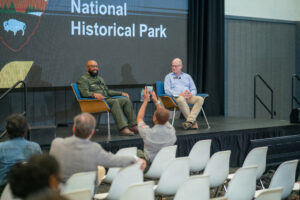The April 18 Transform Westside Summit, held at The Gathering Spot, invited community members to reflect on how honoring the past — especially through historic preservation — can help shape a stronger, more unified Westside.
This month’s Summit focused on 234 Sunset Avenue, the historic Vine City home where Dr. Martin Luther King Jr. and his family lived from 1965 until and after his assassination, with insights from Reginald Chapple, Superintendent of the Martin Luther King, Jr. National Historical Park & Preservation District at the National Park Service. The conversation explored how restoration of this historic home can carry forward the legacy of Dr. King and Mrs. Coretta Scott King while inspiring present-day progress.
Westside Future Fund President & CEO John Ahmann and Summit co-host Ebony Ford, a proud English Avenue resident, opened the program by celebrating National Volunteer Month and the vital role volunteers play in advancing community revitalization.
“It’s a time to celebrate the power of people coming together to make a difference,” said Ford. “Here at Westside Future Fund, we believe in doing with the community, not to the community.”
A thoughtful devotion was given by Mandy Hazelton, Visual Information Specialist for the Martin Luther King, Jr. National Historical Park and Preservation District at the National Park Service.
Key Highlights from the Discussion
Preserving 234 Sunset Avenue
Tucked in the heart of Vine City, 234 Sunset Avenue is more than a house — it’s a living legacy. In 2019, the National Park Foundation acquired the home and later transferred it to the National Park Service, which has since worked to restore the site and shape its future as a place for learning and reflection.
“We want the house to represent what is possible when you make a decision to live out what you believe,” said Chapple.
Once restoration is complete, the home will become a museum honoring the life of Dr. King and the pivotal contributions of Mrs. Coretta Scott King, ensuring their story continues to inspire future generations.
Community Voices Shape the Future
Chapple emphasized that community input is key to the next phase of the project. Public comment sessions will soon be part of the federal NEPA process, giving residents the opportunity to guide how this important site is preserved and activated. The goal is for the museum to be fully operational by 2029.
“Atlanta can speak to peace, justice, and equality in a way no other place can,” Chapple said. “We are an international magnet for folks hungering for how to live together and thrive.”
A Shared Vision for the Beloved Community
The conversation reminded attendees that the legacy of the Civil Rights Movement lives on not only in historic landmarks but in the everyday work of community members. From preserving history to empowering residents, the path to a beloved community is paved by shared service, storytelling, and commitment.
Creating the beloved community takes all of us — working hand in hand, rooted in service, and united by a shared vision.
Miss the event? Watch the full April Transform Westside Summit on our YouTube channel.

